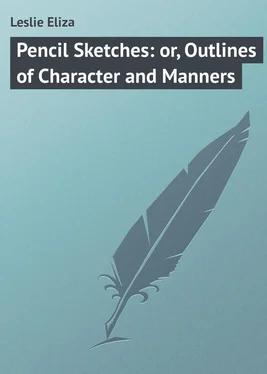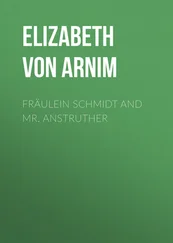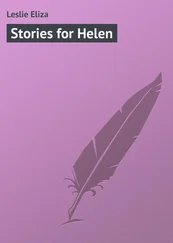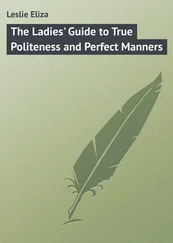Eliza Leslie - Pencil Sketches - or, Outlines of Character and Manners
Здесь есть возможность читать онлайн «Eliza Leslie - Pencil Sketches - or, Outlines of Character and Manners» — ознакомительный отрывок электронной книги совершенно бесплатно, а после прочтения отрывка купить полную версию. В некоторых случаях можно слушать аудио, скачать через торрент в формате fb2 и присутствует краткое содержание. Жанр: foreign_prose, foreign_humor, на английском языке. Описание произведения, (предисловие) а так же отзывы посетителей доступны на портале библиотеки ЛибКат.
- Название:Pencil Sketches: or, Outlines of Character and Manners
- Автор:
- Жанр:
- Год:неизвестен
- ISBN:нет данных
- Рейтинг книги:3 / 5. Голосов: 1
-
Избранное:Добавить в избранное
- Отзывы:
-
Ваша оценка:
- 60
- 1
- 2
- 3
- 4
- 5
Pencil Sketches: or, Outlines of Character and Manners: краткое содержание, описание и аннотация
Предлагаем к чтению аннотацию, описание, краткое содержание или предисловие (зависит от того, что написал сам автор книги «Pencil Sketches: or, Outlines of Character and Manners»). Если вы не нашли необходимую информацию о книге — напишите в комментариях, мы постараемся отыскать её.
Pencil Sketches: or, Outlines of Character and Manners — читать онлайн ознакомительный отрывок
Ниже представлен текст книги, разбитый по страницам. Система сохранения места последней прочитанной страницы, позволяет с удобством читать онлайн бесплатно книгу «Pencil Sketches: or, Outlines of Character and Manners», без необходимости каждый раз заново искать на чём Вы остановились. Поставьте закладку, и сможете в любой момент перейти на страницу, на которой закончили чтение.
Интервал:
Закладка:
"Don't believe him," screamed Mrs. Blake Bentley; "Mr. Smith indeed! Who is to take his word? Who knows what Mr. Smith is?"
"I do," said a voice from the crowd; and there stepped forward a gentlemen, who had arrived in a chaise with a friend about half an hour before. "I had the pleasure of knowing him intimately in England, when I was minister to the court of St. James's."
"May be you bought your tins at his shop," said Aunt Quimby.
The ex-ambassador in a low voice exchanged a few words with Mr. Smith; and then taking his hand, presented him as the Earl of Huntingford, adding, "The only tin he deals in is that produced by his extensive mines in Cornwall."
The whole company were amazed into a silence of some moments: after which there was a general buzz of favourable remark; Captain Cheston shook hands with him, and all the gentlemen pressed forward to be more particularly introduced to Lord Huntingford.
"Dear me!" said Aunt Quimby; "to think that I should have been so sociable with a lord – and a real one too – and to think how he drank tea at Billy Fairfowl's in the back parlour, and ate bread and butter just like any other man – and how he saved Jane, and picked up Johnny – I suppose I must not speak to you now, Mr. Smith, for I don't know how to begin calling you my lord. And you don't seem like the same man, now that you can look and talk like other people: and (excuse my saying so) even your dress looks genteeler."
"Call me still Mr. Smith, if you choose," replied Lord Huntingford; and, turning to Captain Cheston, he continued – "Under that name I have had opportunities of obtaining much knowledge of your unique and interesting country: – knowledge that will be useful to me all the remainder of my life, and that I could not so well have acquired in my real character."
He then explained, that being tired of travelling in Europe, and having an earnest desire to see America thoroughly, and more particularly to become acquainted with the state of society among the middle classes (always the truest samples of national character), he had, on taking his passage in one of the Liverpool packets, given his name as Smith, and put on the appearance of a man in very common life, resolving to preserve his incognito as long as he could. His object being to observe and to listen, and fearing that if he talked much he might inadvertently betray himself, he endeavoured to acquire a habit of taciturnity. As is frequently the case, he rather overdid his assumed character: and was much amused at perceiving himself rated somewhat below mediocrity, and regarded as poor Mr. Smith.
"But where is that Baron fellow?" said Mrs. Quimby; "I dare say he has sneaked off and taken the railroad himself, while we were all busy about Lord Smith."
"He has – he has!" sobbed Miss Bentley; who in spite of her grief and mortification, had joined the group that surrounded the English nobleman; "and he has run away with my beautiful diamond ring."
"Did he steal it from your finger?" asked Aunt Quimby, eagerly; "because if he did, you can send a constable after him."
"I shall do no such thing," replied Matilda, tartly; then turning to her mother she added, "It was when we first went to walk by the river side. He took my hand and kissed it, and proposed exchanging rings – and so I let him have it – and he said he did not happen to have any ring of his own about him, but he would give me a magnificent one that had been presented to him by some emperor or king."
"Now I think of it," exclaimed Mrs. Bentley, "he never gave me back my gold essence-bottle with the emerald stopper."
"Now I remember," said Miss Turretville, "he did not return me the beautiful fan he took out of my hand the other evening at Mrs. De Mingle's. And I doubt also if he restored her diamond opera glass to the Princess of Saxe Blinkinberg."
"The Princess of Saxe Fiddlestick!" exclaimed Aunt Quimby; "do you suppose he ever really had anything to do with such people? Between ourselves, I thought it was all fudge the whole time he was trying to make us believe he was hand and glove with women that had crowns on their heads, and men with diamond coats, and kings that shot peach stones. The more he talked, the more he looked like Jacob Stimbel – I'm not apt to forget people, so it would be strange if I did not remember our Jake; and I never saw a greater likeness."
"Well, for my part," said Miss Turretville, candidly, "I really did think he had serfs, and a castle with ramparts, and I did believe in the banditti, and the captain just like Charles De Moor. And I grieved, as I often do, that here, in America, we had no such things."
"Pity we should!" remarked Aunt Quimby.
To be brief: the Bentleys, after what had passed, thought it best to order their carriage and return to the city: and on their ride home there was much recrimination between the lady and her eldest daughter; Matilda declaring, that she would never have thought of encouraging the addresses of such an ugly fellow as the baron, had not her mother first put it into her head. And as to the projected elopement, she felt very certain of being forgiven for that as soon as she came out a baroness.
After the departure of the Bentleys, and when the excitement, caused by the events immediately preceding it, had somewhat subsided, it was proposed that the dancing should be resumed, and Lord Huntingford opened the ball with Mrs. Cheston, and proved that he could dance, and talk, and look extremely well. As soon as she was disengaged, he solicited Myrtilla's hand for the nest set, and she smilingly assented to his request. Before they began, Aunt Quimby took an opportunity of saying to her: "Well, Myrtilla; after all you are going to exhibit yourself, as you call it, with Mr. Smith."
"Oh! Aunt Quimby, you must not remember anything that was said about him while he was incog – "
"Yes, and now he's out of cog it's thought quite an honour to get a word or a look from him. Well – well – whether as poor simple Mr. Smith, or a great lord that owns whole tin mines, he'll always find me exactly the same; now I've got over the first flurry of his being found out."
"I have no doubt of that, Aunt Quimby," replied Myrtilla, giving her hand to Lord Huntingford, who just then came up to lead her to the dance.
The afternoon passed rapidly away, with infinite enjoyment to the whole company; all of whom seemed to feel relieved by the absence of the Blake Bentley party. Aunt Quimby was very assiduous in volunteering to introduce ladies to Lord Smith, as she called him, and chaperoned him more than ever.
The Chestons, perfectly aware that if Mrs. Quimby returned to Philadelphia, and proceeded to Baltimore under the escort of Mr. Smith, she would publish all along the road that he was a lord, and perhaps convert into annoyance the amusement he seemed to find in her entire want of tact, persuaded her to defer the Baltimore journey and pass a few days with them; promising to provide her with an escort there, in the person of an old gentleman of their neighbourhood, who was going to the south early next week; and whom they knew to be one of the mildest men in the world, and never incommoded by anything.
When the fête was over, Lord Huntingford returned to the city with his friend, the ex-minister. At parting, he warmly expressed his delight at having had an opportunity of becoming acquainted with Captain Cheston and his ladies; and Aunt Quimby exclaimed, "It's all owing to me – if it had not been for me you might never have known them; I always had the character of bringing good luck to people: so it's no wonder I'm so welcome everywhere."
On Captain Cheston's next visit to Philadelphia, he gathered that the fictitious Baron Von Klingenberg was really the reprobate son of Jacob Stimbel of Lancaster, and had been recognised as such by a gentleman from that place. That he had many years before gone to seek his fortune in Europe, with the wreck of some property left him by his father; where (as Lord Huntingford had stated) he had last been seen in London in the capacity of a valet to a German nobleman; and that now he had departed for the west, with the design, as was supposed, of gambling his way to New Orleans. Nothing could exceed the delight of Aunt Quimby on finding her impression of him so well corroborated.
Читать дальшеИнтервал:
Закладка:
Похожие книги на «Pencil Sketches: or, Outlines of Character and Manners»
Представляем Вашему вниманию похожие книги на «Pencil Sketches: or, Outlines of Character and Manners» списком для выбора. Мы отобрали схожую по названию и смыслу литературу в надежде предоставить читателям больше вариантов отыскать новые, интересные, ещё непрочитанные произведения.
Обсуждение, отзывы о книге «Pencil Sketches: or, Outlines of Character and Manners» и просто собственные мнения читателей. Оставьте ваши комментарии, напишите, что Вы думаете о произведении, его смысле или главных героях. Укажите что конкретно понравилось, а что нет, и почему Вы так считаете.












